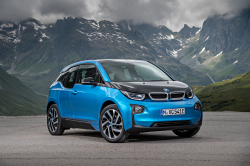— A BMW Facebook ad is banned in England after UK’s Advertising Standards Authority (ASA) ruled the video ad was misleading.
The advertisement was a paid-for Facebook post that contained customer testimonials about the BMW i3, including the claim, “With zero emissions, the i3 really is a clean car and helps to give back to the environment.”
BMW responded to the ASA by saying the i3 is an electric vehicle offered with the option of a "range extender," what the automaker calls the BMW i3 REx. The range extender is a small gasoline engine that, unlike hybrid vehicles, does not drive the car but maintains the charge on the battery that allows the car to continuously drive on pure electric.
BMW told the ASA the ad uses unscripted testimonials from real customers, and the automaker would usually qualify a “zero emissions” claim with a reference to “driving,” but the ad wasn't edited since it is based on unscripted customer testimonials.
BMW says the wording in the ad doesn't imply the production of the electricity needed to charge the i3’s battery would cause zero emissions.
The automaker argues information on the BMW i3 is available on the website that includes the prominent statement, “it generates zero driving emissions,” making clear the "zero emissions” claim refers to driving emissions only.
BMW says the reference to the “clean car” should have been interpreted in the same manner as when consumers compare an electric car to a gas-powered car.
In addition, BMW says that because the i3 electric car has no emissions when driving, the automaker is able to advertise the car as “green,” which it considers comparable to “clean."
Further, BMW says the statement, “and helps to give back to the environment,” is not misleading given the context of the ad and the consumer comparing the environmental footprint she would have left if she had driven a gas-fueled car.
Therefore, in the context of the whole ad, the ad doesn't mean that buying a car has a net positive effect on the environment compared to not buying a car. Additionally, the statement is qualified with the phrase “helps to” and did not assert that buying the product was good for nature.
The ASA notes that because the range extender has a gas engine that can be used if required, the car has an official emissions figure. Furthermore, because cars that use gasoline cannot be described as “zero emissions” or as a “clean cars,” it is not clear from the ad that the claim was in relation to the electric battery model only, therefore the advertisement is misleading.
Concerning the statement, “helps to give back to the environment,” the ASA says it understands BMW considers the statement is meant as a comparison between buying a electric car and buying a gasoline-powered car. However, UK officials don't believe this was sufficiently clear in the ad.
The ASA says the i3 advertisement must not ever again appear in its current form and BMW shouldn't make environmental claims unless there is sufficient substantiation they are true.
Although all the advertising fuss is in the UK, the automaker has experienced problems in the U.S. with the BMW i3.
About a week ago, BMW recalled 32,000 model year 2014-2018 BMW i3 electric and hybrid cars because small adult drivers not wearing seat belts are at an increased risk of neck injuries in frontal crashes.
Separately, a lawsuit alleges BMW i3 REx cars experience sudden deceleration when the vehicles switch from battery power to the gas-powered Range Extenders.

